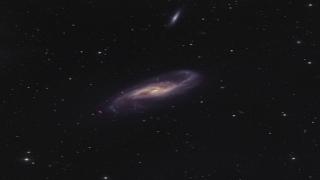Bibcode
Laurikainen, E.; Salo, H.; Buta, R.; Knapen, J. H.
Bibliographical reference
The Astrophysical Journal Letters, Volume 692, Issue 1, pp. L34-L39 (2009).
Advertised on:
2
2009
Citations
92
Refereed citations
83
Description
The origin of S0 galaxies is discussed in the framework of early mergers
in a cold dark matter cosmology, and in a scenario where S0s are assumed
to be former spirals stripped of gas. From an analysis of 127 early-type
disk galaxies (S0-Sa), we find a clear correlation between the scale
parameters of the bulge (r eff) and the disk (h
R), a correlation which is difficult to explain if these
galaxies were formed in mergers of disk galaxies. However, the stripping
hypothesis, including quiescent star formation, is not sufficient to
explain the origin of S0s either, because it is not compatible with our
finding that S0s have a significantly smaller fraction of bars (46%
± 6%) than their assumed progenitors, S0/a galaxies (93% ±
5%) or spirals (64%-69%). Our conclusion is that even if a large
majority of S0s were descendants of spiral galaxies, bars and ovals must
play an important role in their evolution. The smaller fraction
particularly of strong bars in S0 galaxies is compensated by a larger
fraction of ovals/lenses (97% ± 2% compared to 82%-83% in
spirals), many of which might be weakened bars. We also found massive
disklike bulges in nine of the S0 galaxies, which might have formed at
an early gas-rich stage of galaxy evolution.
Related projects

Spiral Galaxies: Evolution and Consequences
Our small group is well known and respected internationally for our innovative and important work on various aspects of the structure and evolution of nearby spiral galaxies. We primarily use observations at various wavelengths, exploiting synergies that allow us to answer the most pertinent questions relating to what the main properties of
Johan Hendrik
Knapen Koelstra